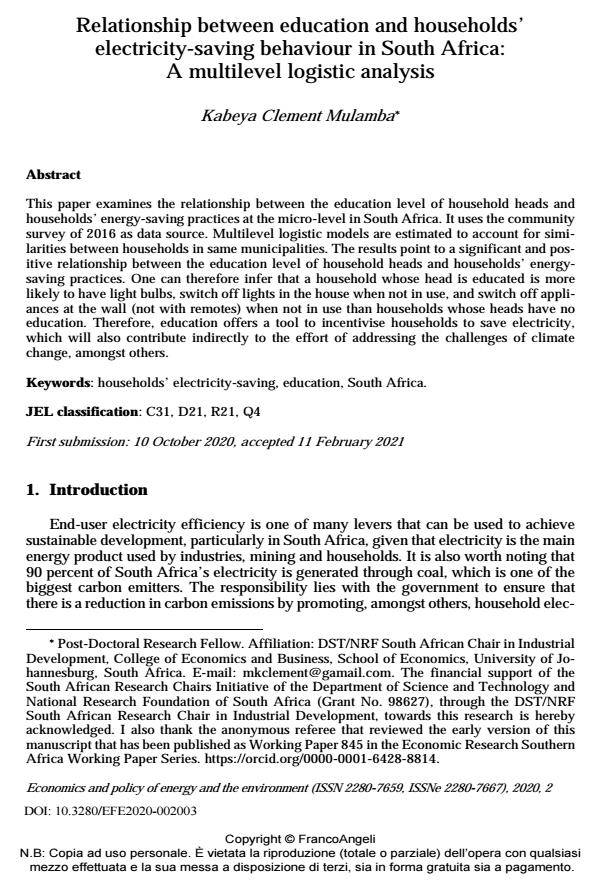Relationship between education and households’ electricity-saving behaviour in South Africa: A multilevel logistic analysis
Titolo Rivista ECONOMICS AND POLICY OF ENERGY AND THE ENVIRONMENT
Autori/Curatori Kabeya Clement Mulamba
Anno di pubblicazione 2021 Fascicolo 2020/2
Lingua Inglese Numero pagine 24 P. 51-74 Dimensione file 471 KB
DOI 10.3280/EFE2020-002003
Il DOI è il codice a barre della proprietà intellettuale: per saperne di più
clicca qui
Qui sotto puoi vedere in anteprima la prima pagina di questo articolo.
Se questo articolo ti interessa, lo puoi acquistare (e scaricare in formato pdf) seguendo le facili indicazioni per acquistare il download credit. Acquista Download Credits per scaricare questo Articolo in formato PDF

FrancoAngeli è membro della Publishers International Linking Association, Inc (PILA), associazione indipendente e non profit per facilitare (attraverso i servizi tecnologici implementati da CrossRef.org) l’accesso degli studiosi ai contenuti digitali nelle pubblicazioni professionali e scientifiche.
This paper examines the relationship between the education level of household heads and households’ energy-saving practices at the micro-level in South Africa. It uses the community survey of 2016 as data source. Multilevel logistic models are estimated to account for similari-ties between households in same municipalities. The results point to a significant and positive relationship between the education level of household heads and households’ energy-saving practices. One can therefore infer that a household whose head is educated is more likely to have light bulbs, switch off lights in the house when not in use, and switch off appliances at the wall (not with remotes) when not in use than households whose heads have no education. Therefore, education offers a tool to incentivise households to save electricity, which will also contribute indirectly to the effort of addressing the challenges of climate change, amongst oth-ers.
Parole chiave:Households’ electricity-saving, education, South Africa.
Jel codes:C31, D21, R21, Q4
Kabeya Clement Mulamba, Relationship between education and households’ electricity-saving behaviour in South Africa: A multilevel logistic analysis in "ECONOMICS AND POLICY OF ENERGY AND THE ENVIRONMENT" 2/2020, pp 51-74, DOI: 10.3280/EFE2020-002003